Tips and tricks from our dual career PhD fellows
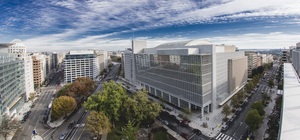
World Bank Group Headquarters, Washington D.C. Photo: World Bank
To kick off the 2023–2024 academic year, three of our dual career PhD fellows – Ari Perdana, Ilsa Meidina and Laisa Daza Obando – held a panel discussion about careers in multilateral development banks, describing their personal experiences of working in these organisations and offering advice for those wanting to enter the field. Here’s a short summary of what they had to share.
What are multilateral development banks (MDBs) and what do they do?
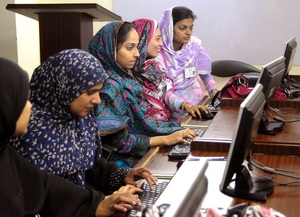
An example of an MDB-funded project: young women learn computer skills at the Khowaja Institute of IT, Hyderabad, Pakistan. Photo: World Bank
MDBs are international financial institutions owned by two or more countries. The mission of an MDB is to promote development in low-income countries. They provide development financing as well as technical expertise, and their staff are considered international civil servants.
Some of these institutions are regional – for example, the Asian Development Bank, the European Investment Bank and the Caribbean Development Bank.
MDBs support the governments of low-income countries in the following ways:
- Improving infrastructure
- Assisting with emerging areas (e.g. clean energy, disaster resilience or smart cities)
- Poverty reduction
- Improving trade, governance and economic reforms
- Private sector financing
- Budget support
- Financial assistance with emergencies – but not humanitarian relief
How do MDB projects work?
The first phase of any MDB-financed project is planning. When a country requests a loan from an MDB for a particular project, the bank’s country team first calculates the project’s expected economic growth, risk assessment, cost-benefit analysis and so on.
Once the resource envelope (the budget and overview of available resources) has been determined, a team is then assembled of the people with the required specialist background(s) for that particular project, and the project preparation phase begins.
In order for the loan to be approved, the project must then pass through the approval stage, in which the borrower must show that the project’s implementation will not harm the environment or local populations. This phase is managed by “safeguards” – experts in areas such as environmental law, Indigenous rights and gender issues, for example – who assess whether a series of project-dependent criteria can be met.
Next, if approved, the project is implemented, possibly with technical support from the MDB in addition to its financial support.
Finally, once completed, the project is evaluated by the MDB’s professional evaluators to check that the project is delivering (or has delivered) the results that were promised.
What types of jobs are available in MDBs?
Operational positions: Essentially those who prepare, provide or approve loans
Non-operational positions: Support staff, including not only legal, procurement, finance, HR, communications, etc., but also knowledge management, evaluations, research and partnerships
- International staff are hired by headquarters and may be required to move to another location after as little as 2 or 3 years.
- Local staff are hired by the country office and will need the right to be able to work in that country. Furthermore, there is no mobility possible in these positions, and you cannot simply transfer internally from a local staff position to an international one – you need to apply for the international positions, just like an external candidate.
- Young professionals programmes or internships offered vary depending on the bank, but as an example, at the Asian Development Bank (ADB), their young professionals programme lasts 3 years and enables you to rotate in different departments.
- To do an internship at either the World Bank or ADB, you must be enrolled in a postgraduate degree programme (either PhD or master’s). There are two internship openings each year at both these banks, and these opportunities are offered per team or department, targeting specific tasks.
- Regarding consultancy opportunities, consultants can be hired on a project basis – up to 150 days a year typically, with very specific terms of reference, within a specific timeframe. There are also long-term consultants, with contracts of a year or more. Most staff start their career in MDBs as short- or long-term consultants.
- For almost all (operational) staff openings, a master’s degree is a minimum, and a PhD is useful.
How do you get your foot in the door?

ADB Headquarters, Philippines. Photo: Asian Development Bank
- Competition for long-term jobs at MDBs is fierce, but there is always a need for consultants, so don’t be afraid of short-term contracts. From there, you have a good chance of being offered more work with them in the future.
- Write a research paper about an MDB or development bank, e.g. for your master’s thesis.
- Monitor and attend public events that MDBs organise, in order to hear the terminology they use and get a sense of the environment you would be entering.
- Bear in mind that there are older, more established MDBs and newer ones – the newer ones are typically growing and thus have more jobs available.
- Try applying to consultancy companies that get their consultants into MDBs.
- Some companies sponsor internships in MDBs, so it’s worth researching all available possibilities.
- It’s worth approaching country-level development banks for a job if you can’t get into an MDB straight away.
- When applying to MDB vacancies, carefully check the eligibility requirements before applying, as certain nationalities are not eligible, depending on the bank and the position.
- Entry-level jobs include analyst / research analyst positions, which usually require two years of experience after a master’s degree.
- At both the ADB and the World Bank, the median age of the staff is around 42 years old. As such, you could go first into more sector-specific work and later pivot into a career at an MDB.
What is it like to have an MDB career?
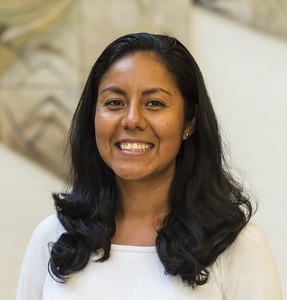 Laisa Daza Obando – Consultant in Disaster Risk Management Specialist at the World Bank in Washington, D.C., U.S.
Laisa Daza Obando – Consultant in Disaster Risk Management Specialist at the World Bank in Washington, D.C., U.S.
Laisa is working on the Global Program for Safer Schools, which involves analysis for efficient investments and integrated solutions in school infrastructure. Her specific role is particularly geared toward ensuring that schools built in disaster-prone areas don’t collapse.
Skills needed for the role: Project management, disaster risk management, good knowledge of the education sector, technical analysis, teamwork and writing (particularly the ability to synthesise technical data into a concise report).
Most rewarding aspects of her role: Going on missions and being able to help governments address problems at a national scale and in a more effective way.
Most challenging aspects: Working across multiple time zones.
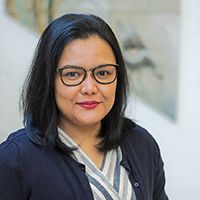 Ilsa Meidina – Senior Social Protection Specialist at the World Bank in Jakarta, Indonesia
Ilsa Meidina – Senior Social Protection Specialist at the World Bank in Jakarta, Indonesia
Ilsa has been working for almost nine years at the World Bank and currently provides analytical and advisory support to the governments of Indonesia and Timor-Leste on evidence-based policymaking, particularly in the areas of social assistance, social insurance, paid work and migration. She also contributes to global and regional knowledge products such as reports and policy notes.
Skills needed for the role: Sector knowledge, project management, staff management and mentoring, research and data analysis, policy dialogue and languages.
Most rewarding aspects of her role: When her policy recommendations are adopted into law or regulation.
Most challenging aspects: The fragility context and occasional strong geopolitical interests over a country. “Development partners don’t always see eye-to-eye, so they sometimes fight over influence and money. Sometimes the banks are not the richest partner – for example, you might have a [developed] country donating a huge amount of money to a developing nation, and that clouds the judgment of a country about what’s best for their people.”
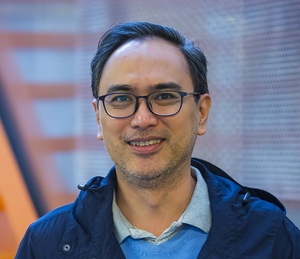 Ari Perdana – Senior Evaluation Specialist at the Asian Development Bank in Manila, The Philippines
Ari Perdana – Senior Evaluation Specialist at the Asian Development Bank in Manila, The Philippines
Ari works as part of a team that analyses and makes independent evaluations of completed projects to discover and document whether a loan did in fact result in the planned positive impacts. Ultimately, the evaluation comes down to two key aspects: accountability and learning. During investigations, he and his team examine questions around what’s working, what’s not, and what can be scaled up or prevented in the future. They also do research-style enquiries on what to evaluate, how to best collect data and how to disentangle different factors.
Skills needed for the role: Relevant sectoral skills, people skills, qualitative and quantitative evaluation skills, and narrative writing skills to communicate results to governments.
Most rewarding aspects of his role: Going to the field and meeting beneficiaries and stakeholders in various countries, as well as the freedom to set the agendas of his evaluations, including who to interview and the opportunity to lead some evaluation reports.
Most challenging aspects: The occasional need to confront colleagues in operations due to the findings of the evaluations, which requires the ability to manage potential tension and explain the findings in a calm, constructive way.
Keen to learn even more and/or access links to relevant resources?
Download an overview of the session’s presentation slides here.
ANY COMMENTS?
NOTA BENE
The opinions expressed here do not necessarily reflect the views of UNU.
MEDIA CREDITS
Photos by World Bank Photo Collection (both cropped slightly) and Asian Development Bank on Flickr. Photos of our fellows by H. Pijpers / UNU-MERIT




